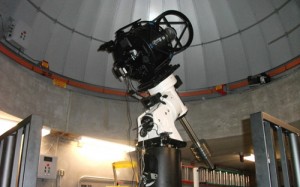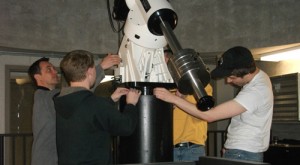
With the help of a few students, physics professor Gerry Ruch hopes to have St. Thomas’ observatory fully functional by the end of summer.
After spring semester, he will program the observatory’s computer system and integrate the observatory, which opened in September, into physics classes and other programs so it can be used by next fall.
“Getting all of that to work together takes a lot of time and fine tuning,” Ruch said. “Over the summer, we’re going to actually get in there and get the work done.”
Ruch said the dedication in September showed the St. Thomas community and general public how the observatory works, although it wasn’t completely finished at the time.
“We kind of ran at full speed to get to the state where on opening day we could take people up there, point at a few things and get some images up on the screen,” Ruch said.
Much of the work this summer will go into programming the observatory’s computers to control the telescope.
“Our plan is that it’s going to be fully robotic,” Ruch said. “Everything in there is under computer control.”
Ruch said he also wants to create a Web interface so users can “control [the telescope] over the Internet.”
Student benefits inside and out of classes
Students taking an astronomy class or other physics courses will use the observatory as part of their lab classes next year, which Ruch will start developing once the observatory is working properly.
Junior David Stephens, who is currently taking Ruch’s astronomy class, said making the observatory part of labs is beneficial for future students.

“I think it’d be awesome because everything you learn in class, you get to see in real life,” Stephens said. “[It] brings the classroom to life.”
Ruch also plans to hire student workers to supervise the observatory while other students are using it.
This semester, Ruch handpicked a small group of students to work on the telescope in the observatory. Junior Heath May is one of the students making adjustments to the Planewave CDK-17 telescope to prep it for use next year.
“Since the observatory is still pretty new, we’re working on getting some basic adjustments made to the mount,” May said. “When you’re trying to be accurate within fractions of a degree in the sky, even the slightest loose bolt can make a difference.”
The physics department is also teaming up with the School of Education to develop a separate astronomy lab for education majors.
“Instead of taking the regular labs, they can take this lab and develop a little bit of curriculum around the telescope,” Ruch said.
Education major and junior Peter Burnham said he wants to enroll in the lab to expand his teaching knowledge in the future.
“I think that’s a good idea because that’s something that kids should be able to learn about,” Burnham said. “It’s important that teachers know how to explain what they’re looking at.”
Public nights will encourage community participation
However, the observatory won’t be exclusive to just the St. Thomas community. The physics department will conduct public nights. On these nights, the department will invite people outside of St. Thomas to use the observatory at least once a month.
Ruch expects to begin programming and developing content for the public nights at the beginning of the summer to give the audience an educational experience at each event. He said the public nights could begin near the end of summer.
“I think that’s really important that everybody has some basic understanding of the scientific process because we’re all stewards of the planet,” Ruch said.
Each night will open with a short program in the auditorium, followed by a demonstration of the telescope in the observatory.
“Once I’ve got their attention with the big pretty pictures and the telescope, I can get that educational mission in there,” Ruch said.
Although the observatory won’t be fully functional until sometime this fall, Ruch said everything is relatively on schedule.
“It’s going to be like a 25- to 50-year facility, so a couple of years to get it running is OK,” Ruch said.
Miles Trump can be reached at mttaylorjohn@stthomas.edu.
